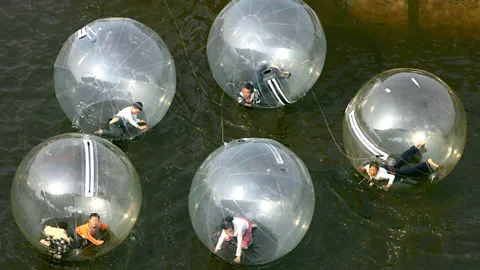Algorithms are making us small-minded
 Getty Images
Getty ImagesYour life is mapped out for you but, not in the way that you think. How predictive algorithms narrow your perspective – and ultimately your choices.
We live in a world of curation. The internet — aided by algorithms that predict what we search, buy, listen to, read, watch and even who we want to date and marry — expertly helps to us find what we want.
Well, as long as it’s similar to whatever we’ve liked in the past.
And there’s the rub. The ubiquity of incredibly powerful algorithms designed to reinforce our interests also ensures that we see little of what’s new, different and unfamiliar. The very things that are at the heart of learning, understanding and innovation. Rather than taking us out of our comfort zone, the digital revolution is enabling each of us to live happily in our own worlds, and in the process closing down opportunities for originality, spontaneity and learning.
The best part of all: we love it this way.
How do I know?
Because we flock to Amazon to buy what their algorithms say we should buy. Because we read news that reinforces what we already believe. And because we even rely on dating sites that specifically seek to match us with similar people.
 Getty Images
Getty ImagesThe consequences of living in our algorithm-enabled straightjackets are not trivial. Intellectually and socially, we are paying a price.
Take, for example, the recent presidential election in the US. The stark political polarisations became arguably more entrenched and increasingly evident here as the tendency of people to seek out confirmatory evidence to support their inherent beliefs or intuition became a self-reinforcing cycle. Different Americans are living in different versions of the same country. By limiting ourselves to certain news organisations and certain pundits, our curated analyses of current events begin to look spectacularly different to those of others with different outlooks and life experiences.
The problem of narrow-mindedness crosses over into business and leadership. Not only has research shown time and time again that open-mindedness improves our sense of wellbeing, but it also leads to better decisions. That was certainly the case with superbosses, those exceptional leaders who built thriving businesses based on agility and creativity in both managerial mindset and business practices.
And then there’s a recent paper published in the Strategic Management Journal that illustrates the importance of both top-down and bottom-up processes for noticing and exploiting new opportunities. While top-down processes, like drawing from previous experiences, are important, they can sometimes blind us from noticing unexpected changes in the industry. In contrast, bottom-up processes, or noticing changes in the environment despite pre-existing knowledge, allow us to pay attention to and exploit unexpected opportunities the competition might miss.
 Getty Images
Getty ImagesWhat comfort zone?
But, we can fight back against the dominance of algorithms to keep us, and our thinking, from being pigeonholed to what we’ve done before. It’s not as hard as we might think to broaden our scope and keep an open mind in our professional and personal lives.
At the office, start with the people you hire. By selecting unusual candidates, people who might think differently than others already on the team, you’re more likely to hear different perspectives and come up with innovative solutions or ideas. Algorithms scan CVs for key words or phrases, but what if you also spent some time reading them individually or tried to search for different key words? Or even better, actually get out there to scout for talent wherever you can find it.
To foster creativity in the long term, when you’re the one in charge, embrace a mindset of change. Rather than constructing an organisation or team along a specific formula, build it around a set of principles and invite employees to come up with new approaches to work that adhere to those principles, but may otherwise be radically different. Again, this was a hallmark of superboss leaders like Jay Chiat, founder and long-time CEO of advertising agency Chiat/Day, who would reward employees for doing things differently, even if those efforts fell short.
More importantly, be honest with yourself and recognise if this narrowing pattern of behaviour seems like you. You might then consider intentionally selecting something out of your standard framework on a regular basis.
The next time you eat out for example, try a cuisine you normally wouldn’t go for. Watch a movie from a completely different genre than you’re used to. Or join a book club. Devote some time to speaking with someone as different from you as possible at the next party or event you attend — and ask them for recommendations of what to read, eat and watch.
 Getty Images
Getty ImagesThere are also websites and apps that can help. Procon.org, for example, presents opposing arguments to controversial issues, while apps like Earbits allow you to discover new music by clicking on different genres, rather than presenting users with more of what they already like.
It will probably take effort to seek out new things. But as the new year approaches, think of it this way: As algorithms and artificial intelligence become better at predicting our needs and narrowing our focus, our ability to adapt and keep learning new things may become crucial to our value as people — in business and in life. That’s certainly worth investing in.
Sydney Finkelstein is the Steven Roth Professor of Management and Director of the Leadership Center at the Tuck School of Business at Dartmouth College. His latest book is Superbosses: How Exceptional Leaders Manage the Flow of Talent (Portfolio/Penguin, 2016).